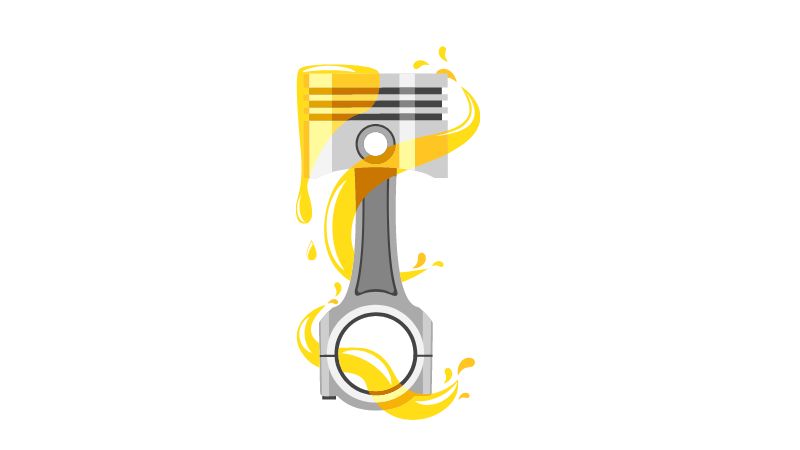A piston is a cylindrical engine element. It acts as a moving end of the explosion chamber. Also, it’s usually created with a cast aluminum alloy to get a lightweight and excellent thermal conductivity. You may wonder what thermal conductivity is. Actually, thermal conductivity is the element’s ability to accomplish and transfer heat.
Aluminum enlarges when heated and must provide adequate clearance in the cylinder bore to maintain free movement of the piston. Insufficient clearance can cause the piston to stick in the cylinder. Additional clearance can cause compression loss and expanded piston noise. That’s why you need to use piston oil always. Besides this, you should change your piston oil frequently to increase engine performance.

What Is Piston Oil?
The function of piston oil inside a piston engine is to cushion and lubricate the moving parts against the stock. Besides this, it helps seal the piston rings on the cylinder walls. They protect the engine’s profound internal components from corrosion and rust.
Thus, they try to keep the engine interior free of sludge, dirt, varnish, and other pollutants. Every aircraft piston engine uses specific oil to lubricate the moving parts. We provide a broad range of piston oils for your aircraft engines. Brands like Aeroshell, Mobil, and Total Oil are the best piston engine oils that you can use on your piston engine.
Piston Oil 5w30:
Piston 5W30 Oil comes from synthetic and unique Active Cleansing Technology. So, using the oil provides you with a smoother ride and a more responsive engine. You can use this oil on diesel, petrol, and CNG engines where you need hard-working oil. This oil can protect and clean your machine.
Hence, it fulfills API SN specifications and provides increased high-speed protection. Undoubtedly, you can use this oil at high temperatures and pressure. Mainly, it also has lower piston deposits and sludge formation than lower-grade oils. The piston oil price range is $1.50-1.80.
Aeroshell Piston Engine Oil:
AeroShell piston engine oil is an ashless dispersant oil specially formulated for piston engines. Actually, this oil blends non-metallic additives with selected (HVI) high-viscosity index base oils. It’s because it works to provide extraordinary strength, dispersion, and anti-foaming performance.
However, the most common grades based on the average ambient temperature at engine start-up are SAE 40, 50, and 60. These grades are equivalent to AeroShell Oil W80, W100, and W120.
Traditionally, the choice is linked to the climate zone – for cold climates AeroShell W80 (-17 – 21°C). On the contrary, AeroShell Oil W100 is for temperate zones (15 – 30°C), and for warm temperatures (above 26°c), AeroShell Oil W120. Basically, AeroShell oils fulfill the SAE Specification J-1899 (Grades SAE 30, 40, 50, and 60).
Aviation Oil:
To run your aircraft engine smoothly, this aviation oil is necessary. Yet, aviation oil also helps this aircraft engine work properly. Today’s aviation oils come to help decrease corrosion. It also helps to extend engine elements life, oil filters, and other essential systems. You can find a large selection of aviation oils and choose them to keep your aircraft strong.
High-performance, clean oil is not crucial for system safety; it also increases engine performance and decreases fuel consumption. We offer a wide range of low-priced oils so you can choose your favorite brands. Moreover, Aviation oils can reduce sludge to protect piston aircraft engines for longer life and enhanced performance. Our aviation oil is available, and you can get it whenever needed.
Aircraft Engine Oil Types:
For aircraft engines, the two main types of oils are ashless dispersant (AD) and mineral oil. Both types come from mineral oil, which is highly refined and petroleum-based.
AD or Ashless dispersant oils can collect debris from the engine inside, and the aircraft’s oil filter can carry it safely. Although synthetic oil mixtures are sometimes utilized in aircraft engines, this is uncommon. Unlike AD and mineral oils, synthetic oils have not come from crude oil. Tests conducted by Shell Oil on fully synthetic solutions in aircraft engines yielded negative results.
Thus, results show engines began to burn more oil and lose compression. After tests, they found that the piston rings were coated in lead byproduct deposits from combustion after disassembly. Many pilots like to use straight mineral oil to break the brand-new engine. But it would help if you recognized that each component manufacturer comes with its recommendations.

Airplane Engine Oil Name:
There are many different aviation lubricants, any of which can be called “airplane oil.” Various hydrocarbon fuel mixtures of kerosene, gasoline, and other hydrocarbons also exist. They have been used as fuels since the beginning of the jet age, all of which can be called “aviation oils.” Airplanes are powered by aviation turbine fuel – also called ATF. ATF has notable properties such as a very high freezing point, low flash point, and fire point.
Airplane or jet oil differs from ordinary petrol or diesel as it has a very high octane content. And you can’t use it for a car or bus. Usually, this type of oil is more efficient, and you can drive longer without creating environmental problems.
AeroShell Fluid 41:
Accordingly, this fluid is a mineral oil-based airplane hydraulic oil. Generally, it comes with outstanding low-temperature properties suitable for a wide range of operating temperatures. Notably, this fluid prevents oxidation and contains a special anti-wear additive. This product is colored red for identification leak detection purposes. Furthermore, it fulfills the MIL-PRF-5606 J and MIL-PRF-5606H specifications.
Nevertheless, you can use this fluid in Aircraft applications where a MIL-PRF-5606 J fluid is recommended. Without that, you can also use it in hydraulic systems at ambient operating temperatures. Likewise, it’s suitable for bucket trucks and other lightweight tools in winter service, subject to harsh low-temperature operation.
Final Word:
For generations, the aviation industry has trusted piston oil to meet the oil demands of every aircraft piston engine. They always find superior products for their piston engine. Aviation engines use a different viscosity rating than automotive and SAE.
They used 65 weight or SAE 30, 80 weight or SAE 40, 100 weight or SAE 50, and 120 weight or SAE 60. Overall, this piston oil is suitable for aviation engines. Finally, this piston oil is also ideal for two or four strokes: carbureted, fuel-injected, or turbocharged engines. It can take care of your engine the way you take care of your airplane.

